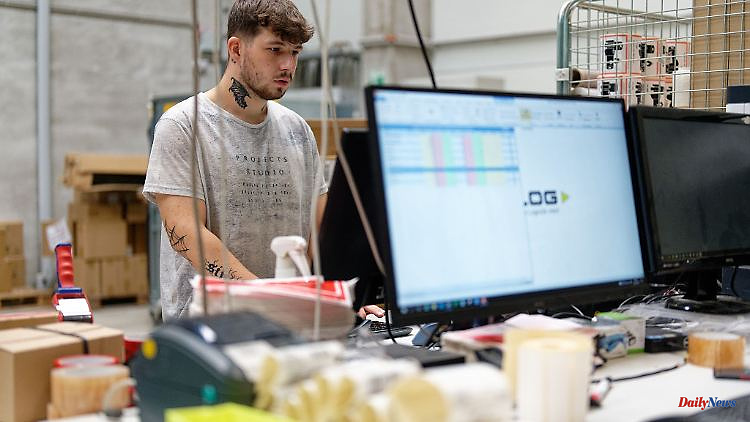The high school diploma in your pocket - and now? What many do not know: In 9 out of 16 federal states, a double qualification is possible - training plus (technical) high school diploma. A path that Pascal Brungs is taking, for example.
Start an apprenticeship or continue to go to school and do the (technical) high school diploma? A question that many young people ask themselves after the tenth grade and thus the secondary school leaving certificate. Pascal Brungs has made his choice: he does both.
The 22-year-old is completing a three-year apprenticeship as a specialist in warehouse logistics at the company Gilog in Frechen (North Rhine-Westphalia) and at the same time wants to acquire a technical college entrance qualification.
Which means: After work, there's still learning on the program. "Sure, it's all a bit exhausting sometimes," says Pascal Brungs. But the amount of time that he is currently investing in a successful start to his professional life will one day pay off, he is convinced of that: "With the double qualification, I'm giving myself a good stepping stone to one day ending up as high up the career ladder as possible ."
According to the Central Association of German Crafts (ZDH), this is currently possible in 9 out of 16 federal states. Namely in Baden-Württemberg, Bavaria, Berlin, Hamburg, Hesse, Lower Saxony, North Rhine-Westphalia, Rhineland-Palatinate and Saxony.
The model, also known as the "BerufsAbitur", which the ZDH launched together with the Conference of Ministers of Education, has existed since the 2017/2018 school year.
However, dual qualifications are not only an option for young people in the trades, but also in industry and commerce. From the point of view of Carsten Berg, head of operational training at the Chamber of Industry and Commerce (IHK) in Cologne, the model offers a major advantage: "No one can take the professional qualification that you acquire from you."
Anyone who goes to a technical college or university with the acquired technical college entrance qualification or general university entrance qualification and realizes that a degree is not the right thing to do has at least completed an apprenticeship. "You can then work in the profession you have learned and don't have to start from scratch in your professional life," says Berg.
But first you have to want to and manage to complete an apprenticeship and also study for the (technical) high school diploma. Pascal Brungs is there with a lot of interest and enthusiasm. "I've never learned as much as I have in the past few months," says the 22-year-old.
Attendance at a vocational school is compulsory during the apprenticeship. A further three hours of schooling are added each week for everyone who is aiming for a vocational diploma or high school diploma. The additional lessons are about acquiring more in-depth knowledge of subjects such as math, German, English and biology. There is also learning to do at home. "I often do this together with my colleagues, then we help and motivate each other," says Brungs.
The commitment that the young people show in their efforts to obtain a double qualification is "really well received" by employers, as Carsten Berg has repeatedly observed. Anyone who has completed a higher school qualification alongside their training has a big advantage in job interviews: "Because it shows a real willingness to perform".
According to Berg, many companies naturally want to retain such highly motivated employees for as long as possible. Therefore, after successful completion, they often have the opportunity to work as a specialist in the respective company.
And those who take up a course of study often stay connected to the training company as an employee or working student. "One day, this may give rise to the opportunity, for example, to move up the ranks as a manager in the company you used to train for, after completing your studies," says Berg.
Pascal Brungs can well imagine a dual course of study later - i.e. working in the company and studying at the same time. It would be conceivable for him to enroll for a degree in logistics, for example, and also gain practical work experience in the company.
First of all, he has to successfully complete his training and at the same time obtain a good technical baccalaureate. On the other hand, he learns a lot during the weekday evenings. "But on the weekends I'm completely free and can sleep in and meet up with my friends." Unless there is an exam in the coming week, then he also sits down for two hours on Saturdays and Sundays.
Complete an apprenticeship and at the same time prepare for the (technical) high school diploma: "The three years are professionally demanding, but it's doable," summarizes Carsten Berg. He thinks it's a pity that this dual qualification model isn't very well known.
Ultimately, employers who are desperately looking for skilled workers benefit from this, as do young adults, for whom many doors are open with the double qualification.
What drives Pascal Brungs? "I want to have a job that I enjoy, one day I would like to be in a managerial position, earn more and, above all, have enough money to be able to start a family in the foreseeable future."












